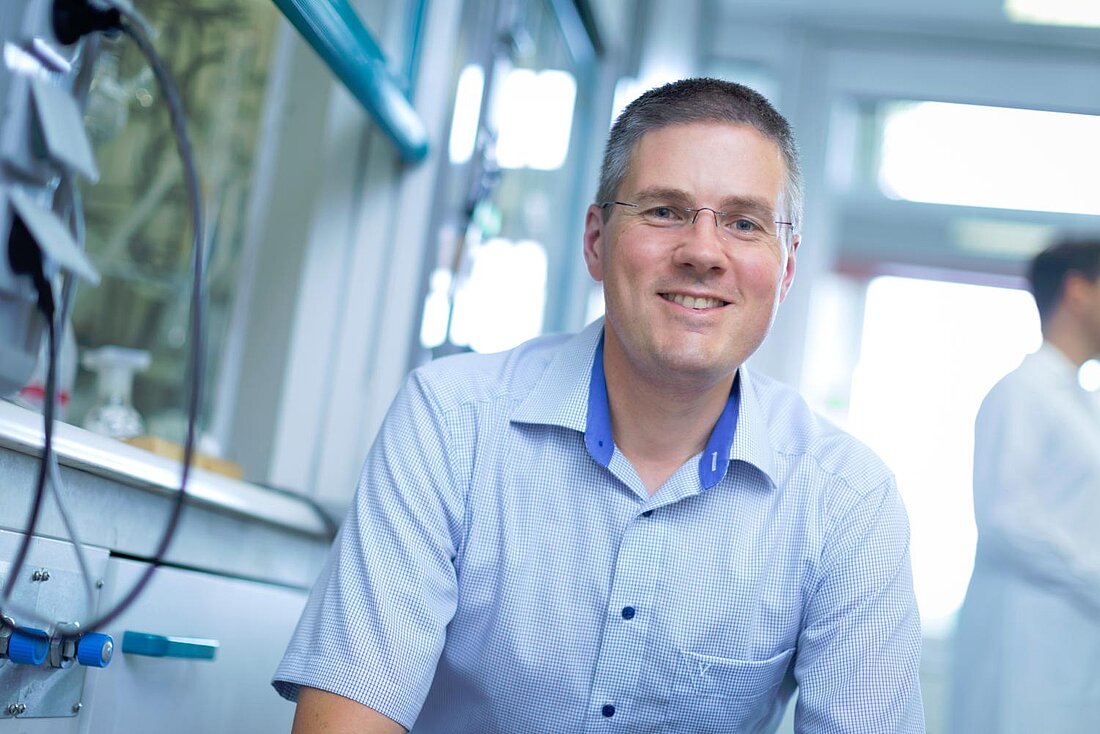
Prof. Streb receives ERC Consolidator Grant

Precisely fitting materials could significantly accelerate the development of powerful batteries, high-precision sensors or innovative information technologies. Until now, however, such customized material design from the atomic level upwards has been considered a pipe dream. Professor Carsten Streb wants to change this with his new project "SupraVox": The chemist plans to explore the polymerization process of metal oxides and ultimately gain control over the structure and reactivity of such materials. To this end, the scientist, who conducts research at the University Institute of Inorganic Chemistry I and as Principal Investigator at the Helmholtz Institute Ulm (HIU) and at POLiS, acquired an ERC Consolidator Grant of around 2 million euros. With this funding instrument, the European Research Council (ERC) enables outstanding scientists to implement groundbreaking concepts over five years and thus strengthens the European research landscape.
The SupraVox project addresses one of the major challenges in materials chemistry: The researchers led by Professor Carsten Streb want to enable the controlled synthesis of metal oxides and thus targeted material design - from the atomic level to nano- and microstructures. Such engineered materials would be a milestone on the way to efficient energy technologies, climate-friendly mobility and industrial catalysis. "Computer simulations have made great strides in materials science: they increase our understanding of chemical processes and replace many laboratory experiments. However, metal oxide synthesis is still carried out according to the trial-and-error principle. With the SupraVox project, we want to fundamentally change this and establish controllable metal oxide polymerization," Streb explains. To achieve this, the researchers have so far lacked a detailed understanding of the polymerization processes and control over the targeted linking of individual building blocks to form long molecular chains.
The ideal building blocks for such a tunable class of materials are molecular metal oxides, so-called polyoxometallates (POMs). In these monomers, structure and reactivity can be changed at the molecular level. Over many years, Carsten Streb's group has done pioneering work on polyoxometallates. They developed novel, self-healing anti-corrosion coatings (POM-IL), multifunctional composites for water treatment or highly active catalysts for sunlight-driven generation of hydrogen.
Nevertheless, knowledge gaps, for example regarding the transition of single POM molecules to polymeric metal oxides, prevent a truly controlled material design.
In the SupraVox research project, Streb and his group are focusing on vanadium-based POMs (V-POMs): using these model monomers, they aim to understand and influence the polymerization chemistry in detail and enable the growth of V-POM chains in a targeted manner. This will make new chemical and electronic properties accessible that will benefit a wide variety of high technologies. Until then, numerous questions between molecular and solid-state chemistry need to be answered: What supramolecular mechanisms control polymerization? How do polymer chains interact with their environment? And how are the structure, electronic properties and reactivity of V-POM polymers related? In contrast, studies on the interfaces of vanadium oxide polymers, which are placed on electrode surfaces, lead to applications. With the aid of high-resolution electron microscopy, among other things, findings for battery and catalyst design are to be obtained. Overall, SupraVox will use V-POMs to demonstrate polymerization concepts that can be transferred to other metal oxides. Ultimately, trial-and-error syntheses will be replaced by predictable material design.
The research environment at the University of Ulm and the neighboring Helmholtz Institute Ulm, which specializes in battery research, are ideal. Both institutions are world leaders in the characterization of functional nanomaterials and have the most sophisticated analytical systems - from the SALVE supermicroscope to electrochemistry labs to simulations, possibly with the help of the JUSTUS 2 supercomputer.
"SupraVox will provide access to a previously unknown class of materials with a wide range of applications. I am convinced that we will enable important developments for future technologies such as sustainable energy storage and quantum electronics," summarizes Professor Carsten Streb.
About the ERC Consolidator Grant ERC
Consolidator Grants are aimed at excellent researchers in the consolidation phase. The grants are primarily intended to support them in expanding their independent research group and increasing their international visibility. Typically, promising scientists from all disciplines apply seven to twelve years after their doctorate. An international jury, advised by external experts, decides on the quality of the submitted applications. For their projects, the selected researchers receive up to 2 million euros over five years (plus a start-up budget in some cases). In 2020, 2506 applications were submitted. Of these, 327 researchers from 23 European countries were selected for an ERC Consolidator Grant. The only criterion is the scientific excellence of the researchers and the proposed project. The total funding volume amounts to 655 million euros.
